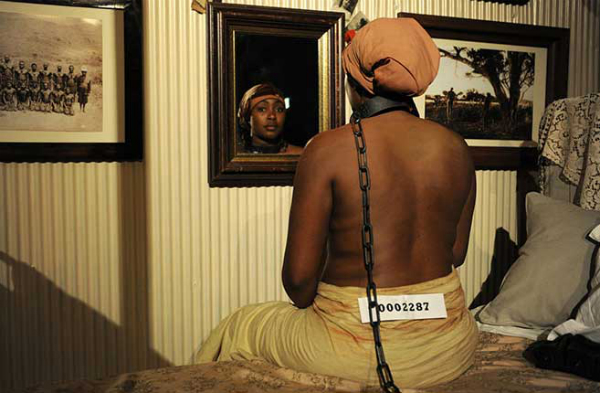Art World
Barbican Responds to Fury Over “Racist” Work
The London arts centre says Brett Bailey's performance is "a watershed work."

The London arts centre says Brett Bailey's performance is "a watershed work."

Artnet News

Controversy around a new exhibition slated to open at London’s Barbican Centre on September 23rd keeps gathering momentum. To date, over 7,000 people have signed a petition asking for the cancellation of Exhibit B (2014), an installation by South African playwright, artist, and curator Brett Bailey, accusing it of being “racist.” The piece is touring from Edinburgh International Art Festival and features live performers, including a black man in a cage and a woman with shackles around her neck.
The renowned London arts center has responded to the pressure by releasing a statement penned by its Head of Theatre, Toni Rackling. “We appreciate that the work tackles controversial and sensitive issues,” writes Rackling. “How successfully the production does this is of course, as with any artwork, subjective, and we can only seek to assure those who have signed the petition that the piece aims to empower and educate rather than exploit.”
“As an organization that presents an international program to a diverse audience I can state absolutely that neither the Barbican nor our partners in this project, Nitro and UK Arts International, would program a production that promoted racism in any way,” he continued.
Some Have Found This Explanation Insufficient
According to the Barbican website, Exhibit B “critiques the ‘human zoos’ and ethnographic displays that showed Africans as objects of scientific curiosity through the 19th and early 20th centuries.” But some have found this explanation insufficient. Artist, curator, and cofounder of Black Activists Rising Against Cuts, Zita Holbourne, wrote of the exhibition: “We don’t believe that in order to remind people of the horrors of racism, enslavement, apartheid and colonial rule it is necessary to place black people in cages and put them on display in an exhibition. This exhibition does nothing to promote race equality.”
Even some of its performers, which are cast locally at every stop of the tour, have expressed a growing unease with the project. A performer from Exhibit B’s recent run in Scotland told the Guardian‘s John O’ Mahony: “How do you know we are not entertaining people the same way the human zoos did? How can you be sure that it’s not just white people curious about seeing black people?” Some people have also taken issue with Bailey’s background—he is a white South African from an affluent family and grew up in the Apartheid years—deeming the artist unsuitably positioned to tackle such sensitive material.
The social outrage, however, contrasts with art critics’ responses, which are mainly positive, if a little shocked. “Unbearable and essential,” wrote Lyn Gardner at the Guardian. The Standard and the Times both gave the piece five-star reviews. The Barbican’s communications manager, Nick Adams echoed these sentiments, telling artnet News: “Previous performances of Exhibit B have attracted a diverse and politically engaged audience and it has been seen as a watershed work that provokes discussion about racism and the historical roots of prejudices.”